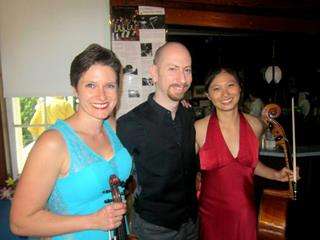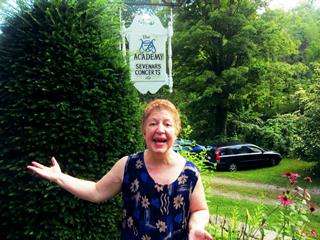|
Back
Revelation in the hills Boston
Sevenars Academy, Route 112 and Ireland Street, South Worthington, Massachusetts
08/04/2013 -
Franz Josef Haydn: Trio No. 39 in G Major, Hob XV/25
Rebecca Clarke: Trio for Violin, Cello and Piano
Antonín Dvorák: Piano Trio Number 2 in G Minor, Opus 26
Adam Nieman (Piano), Joana Genova-Rudiakov (Violin), Sophie Shao (Cello) 
J. Genova-Rudiakov, A. Neiman, S. Shao (© Coco T. Dog)
From its reputation, I’d heard that the Sevenars Concerts were the friendliest of all the summer festivals (which they seem to be). That its setting in the unlikely hill town of South Worthington, Massachusetts was amongst the most scenic (amongst the tops). That in its 45 years managed by the same musical family (pianist Robert Schrade and his seven daughters, all of whose names begin with “R”, thus the title of the Festival), was the most unique. (Sorry, no cigar. Every festival has its own unique status.)
What I hadn’t reckoned on, at my first visit last Sunday was the name Rebecca Clarke.
First, though, the setting is indeed vernally delicious. On a winding road from Goshen to Chesterfield to this little town, founded in 1762, with its old churches and ancient homes. Sevenars itself is in an acoustically splendid clapboard room in a 200-plus year home. Like Lorin Maazel, who had chanced on his farm in Maryland and turned it into a summer opera venue, Robert Schrade had seen this old crumbling home, fixed it up to the lovely airy place it is today and started performances. Nowadays, while his daughters frequently give concerts, more often visiting chamber players are the artists.
The audiences here are greeted by the Schrades, by friends, they have complementary noshing, and conversations. The programs don’t include written notes, but the artists themselves describe the works, giving a more personal touch.

Robelyn Schrade (© Coco T. Dog)
At other points, Robelyn Schrade, offered musical comments and–oh, more tragic than any music–announcing the disappearance of a black Labrador dog in the town. It was difficult to hear anything after that, but I tried.
That was the picture last weekend when three piano trios were played by a newly formed group. Not that violinist Joana Genova-Rudiakov, pianist Adam Nieman and cellist Sophie Shao were anything but experienced on their own. But while the violinist and pianist had performed for a long time together and more or less rule the Manchester Vermont Summer Festival, they had been playing with Sophie Shao for only three days.
The result, though, was anything but ragtag or a mere rehearsal for the Vermont concerts. In fact, Ms. Shao, winner of the most prestigious awards and a noted professor at Princeton, Vassar and Bard (does anybody not teach at Bard??), is a chamber player born to the task. Perhaps as the “newbie”, she was more animated, but as the most internationally famed, she offered that spontaneity, that energy which gave the group such pleasure.
Certainly pleasure was the hallmark of the opening Haydn Trio. The fact that he had composed it in England gives some indication of a virtual eagerness to please, for Haydn was always at his best away from “the palace.” In this case, I was frankly overwhelmed by the beauty of the Sevenarts sounds in this wooden auditorium, seating barely 200. The sounds weren’t over-resonant, but bounced off the walls quite gently, allowing each of the instruments to do its part.
That balance in the first movement variations and the exquisite Poco Adagio would have been sufficient (with Ms. Genova-Rudiakov playing a particularly lovely tune.) But one waits almost impatiently for the Presto Gypsy finale. “Presto”, though, can be tricky. Mr. Nieman certainly has the digits to play it with the right scintillation. But that main theme had more duststorm than wind. The other rondo themes had the right Gypsy bounce. This opening was more worthy of awe than the pure enjoyment Papa Haydn wanted.
The program’s unity continued after the intermission with the Dvorák Trio. Haydn was suitably Mitteleuropean in his major-minor changes, and Dvorák was equally exotic with more Czech tunes and phrases. Obviously more subtle than the Haydn, the work was shaded, unpredicable and only once did I find myself disappointed.
The third movement has some fervent outer sections, and a Trio which is a total contrast. In fact, that central section is so beautiful, so natural, has such avian loveliness, that it should stand out. Alas, the group had little contrast, the movement by itself swung along nicely. But that so typically Dvorák reversion to pure rustic beauty was lost.
And now to the one work which gave this concert a truly rare distinction. Rebecca Clarke was a name totally unknown to me. My homework showed she was a violist, a depressive, she lived in England and died in America, and her offerings were mainly songs and works for her viola.
Naturally I expected this Trio to be a sort of “sunset-in-Somerset” English tweedy little gem. Thus, the first slashing chords made me jump, the rest of the discordant first and second movements had the elements of violence–as well as emblematic notes. What was the Beethoven’s Fifth theme doing here? Were these explosions? How dare she write the second movement as Semplice, when it was anything but simple?
The harmonies themselves were hardly orthodox. She apparently was influenced by Ernest Bloch, but this could have been written by Martinu (Save that Martinu the 1920’s was writing more in Parisian/jazz style, not his later Czech harmonies.) Even so, every so often Ms. Clarke would take a sudden turn from the exotic to a near-Elgarian lushness, only to dart out again.
The finale was most interesting, starting with a distorted childish tune, continuing in that simple if lopsided way, and then, with no prior introduction, the sudden repetition of those harsh notes from the first movement.
I cannot judge the performance, as this was the first time I had heard (or heard of) Rebecca Clarke. But the integrity of this chamber ensemble, and the so moving sounds of the work almost certainly did credit to the composer’s singular language, and the singular setting of Sevenars itself.
Harry Rolnick
|